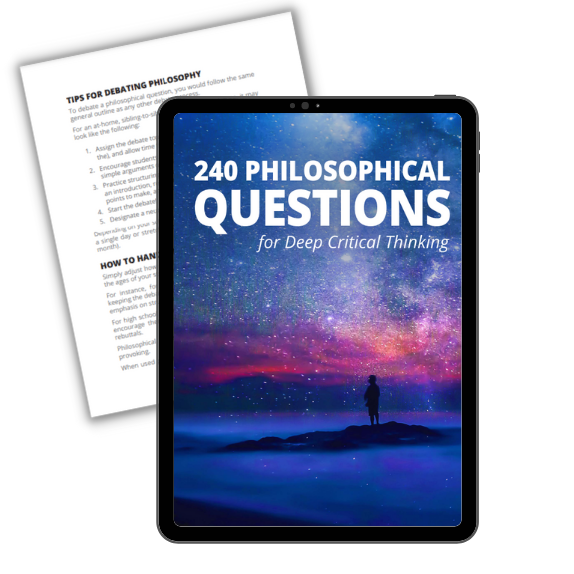Philosophical questions are an effective tool to stimulate and develop critical thought. They examine profound matters like free will and human nature; the source and value of happiness; morality and ethics; love, logic, and knowledge; religion, death, and the meaning of life.
Although such questions can open a “rabbit hole” that leads to endless and seemingly unanswerable questions, a list of philosophical questions to ask about life—like the ones provided below—can be used as a springboard for critical thinking.
Such questions help us evaluate arguments, explore foreign ideas, identify potential biases, and think critically about our own beliefs and presuppositions.
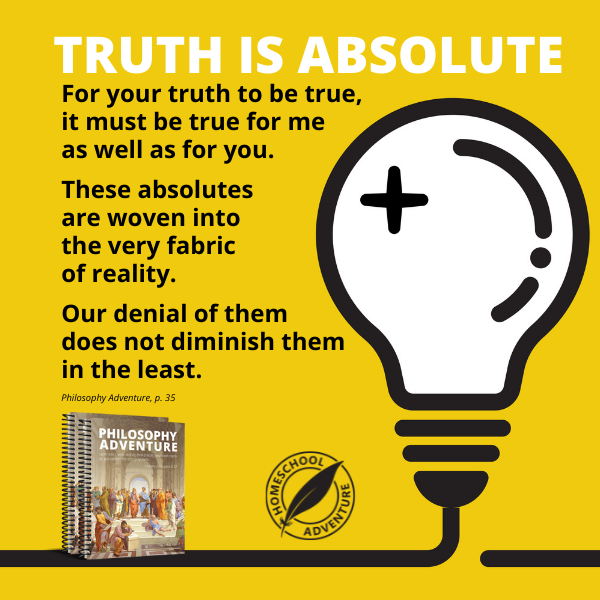
We are preparing our our children to enter a society full of questions … and questionable ideas.
Consequently, it is our responsibility to train them to think critically and, above all, seek truth when asking the deep questions that arise in their own hearts.
First, let’s take a closer look at what a philosophy question is. Then I’ll provide some examples to help encourage deep thinking.
What is a Philosophical Question OR TOPIC?
A philosophical question is open-ended. Since philosophy itself means “love of wisdom,” it logically follows that a philosophical question is one that pursues a deep understanding of the subject examined.
The answer to this type of question isn’t necessarily an easy one—nor is it always black or white. It requires thoughtful reflection.
The deeper the reasoning behind the answer the better.
Bear in mind there’s no such thing as a dumb philosophical question. However, don’t be surprised if the way questions are answered borders on the brink of absurdity at times.
But the goal is to inspire thought.
So … even if your students gives nonsensical responses, if they’re willing to explain how they came to their answer, count it as a win.
(Even giving an incomplete answer is better than not pondering the question at all.)
A good example of a philosophical question is one of the three overarching “pillars” of philosophy.
The 3 Basic But Big Questions of Philosophy Deal with Existence
The fundamental questions of philosophy deal with existence and fall into three main categories::
- Where did we come from?
- Why are we here and how should we live?
- Is there hope for our future and life after death?
How we answer those questions determines what we will value and how we will behave.
With that in mind, it’s clear just how important it is to train our children to ask meaningful questions and seek truthful answers.
The study of philosophy can help us do that.
PDF Download of 240 Philosophical Questions
GET ALL 240 QUESTIONS IN AN INSTANT-DOWNLOAD EBOOK!
Includes strategies for using philosophical questions as debate topics.
It is natural to be inquisitive. Let’s steward our students’ curious natures well!
I’ve gathered 240 philosophy questions to help you (and your students) think through tough philosophical topics together.
It’s tempting to look at these questions as a mere academic exercise.
But philosophical ideas have shaped human history from ancient times until today—for better or for worse.
Look at them, instead, as a means of preparing your students to face (and combat) the deceptive ideas they will soon encounter.
Questions of Free Will and Human Nature

Are we really free?
The question of free will versus determinism has been debated by great thinkers for centuries.
Some contend that we have complete freedom of choice.
Others believe that humans have no free will and cannot be held morally responsible for their actions (determinism).They argue that the choices we make stem exclusively from the nature we are born with and all the influences that surround us.
The Bible teaches that we have free will, and we’re responsible for our actions. As Deuteronomy 30:19 explains:
“… I have set before you life and death, blessings and curses. Now choose life, so that you and your children may live …”
Here are some questions about will and humanity:
- Are humans innately good or evil?
- Can humans change their behavior if given enough time?
- Do humans need God to exist?
- What happens when we die?
- Does consciousness continue after physical death?
- Why does suffering happen?
- Should we try to prevent bad events from happening? If so, then how would we go about doing that?
- What makes human life so valuable?
- What makes us human?
- Why does it matter if we’re alive?
- Is there anything wrong with being selfish?
- Do humans need other people in order to live?
- Can animals feel pain? If so, why don’t they try to avoid hurting each other?
- Are children born good or evil?
- Is it okay to lie to protect yourself?
- What is beauty?
- Do all people deserve respect?
- Did you exist before you were born?
- Where do emotions come from?
- Can we choose our emotions or do they just happen?
- At what age are children held accountable for their actions? How do you determine that?
- Where does self-worth come from?
- How do you determine one’s self-worth?
- Is one human life worth more than another?
- Is ignorance really bliss?
- What is the goal of humanity?
- Can predestination and free will coexist?
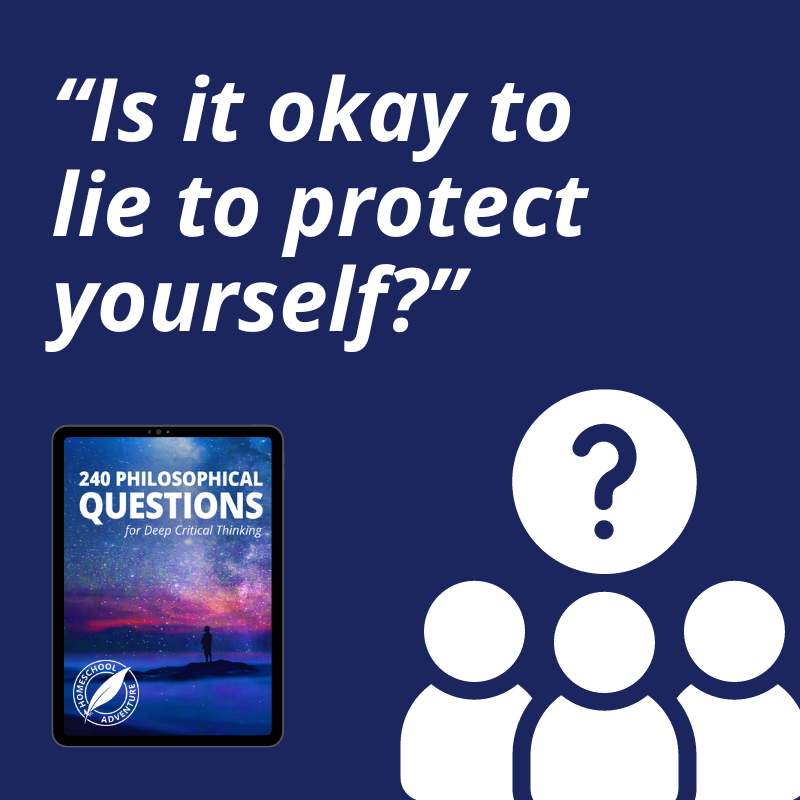
Philosophical Questions About Happiness
The philosopher Aristotle held the view that, “Happiness is the meaning and the purpose of life, the whole aim and end of human existence.”
Yet the very definition of happiness is as diverse as the people who seek it. Some seek it in relationships, others in work, hobbies, or pleasure.
One school of thought says finding happiness requires a life in which every aspect contributes toward personal fulfillment.
Another believes that happiness is “happenstance”—an emotion based on positive circumstances.
What do you think?
Here are some questions to ponder about happiness:
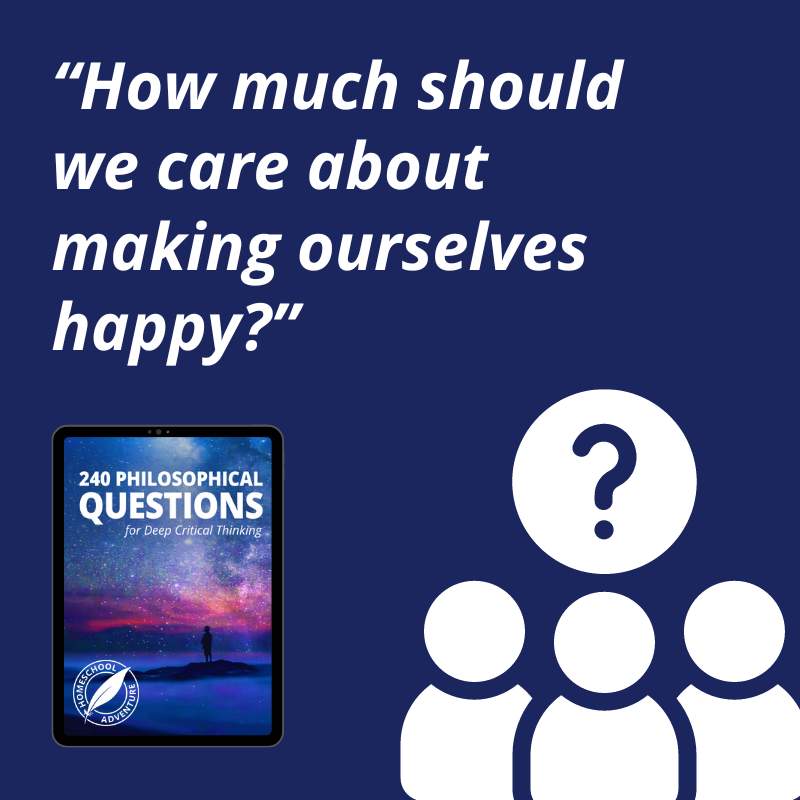
- What does it mean to be happy?
- Can I be happy when faced with suffering?
- Is happiness universal or a matter of perspective?
- How much should we care about making ourselves happy?
- Is it possible to feel happy and sad at the same time?
- Is it really necessary to pursue happiness?
- Are we happier now as a society than in times past? Why or why not?
- Does anyone else’s happiness affect my own?
- If someone has less material wealth than me, does this automatically make him unhappy?
- What brings true happiness?
- Can happiness be measured or quantified, like money and power?
- Are certain types of experiences inherently “happier” than others?
- Is it always best to seek out pleasure over avoiding pain?
- Is happiness just the product of chemical reactions in the brain?
Questions Regarding Morals and Ethics

Questions of morals and ethics are important to explore if you wish to develop critical thinking skills.
Morality and ethics both relate to the distinction between good and bad or right and wrong. However, morality is usually thought of as personal and normative, while ethics is the standards of good and bad distinguished by a particular community or social setting.
Because the seriousness of the two topics can elicit emotional responses, if we’re not careful, debates on ethics and morality can get heated quickly.
A good moral or ethical argument takes the whole picture into account.
For instance, how would you answer the question, “Is killing always wrong?”
Our first instinct may be a resounding Yes!
But looking at the big picture, we might ask: What if it occurs in self-defense? What about soldiers? Are they held to the same ethical standard civilians are?
These are the types of philosophical questions we encounter in this category.
Here are some additional examples:
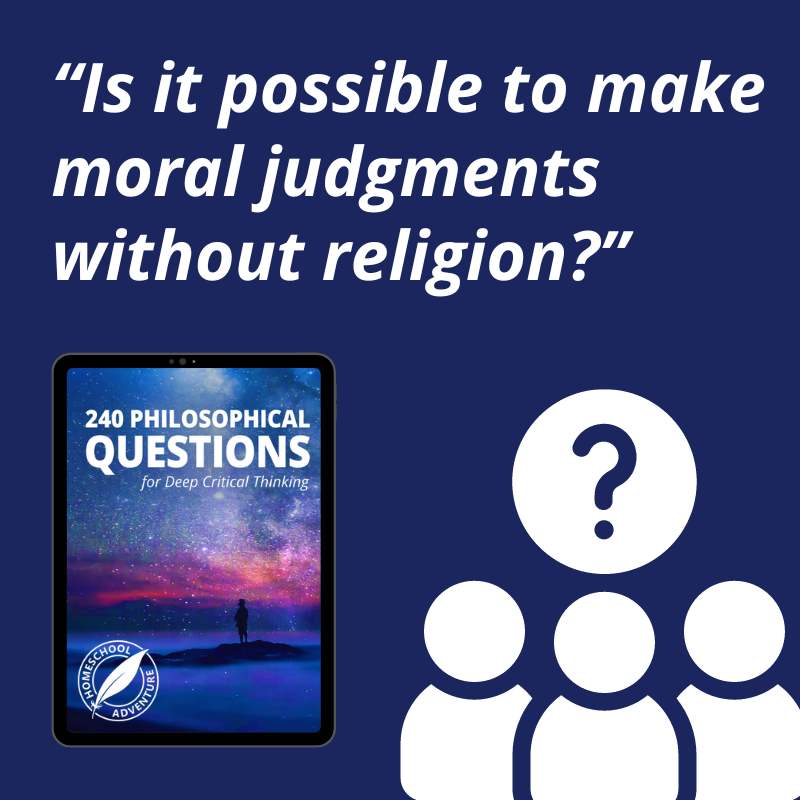
- Is morality relative or absolute?
- Where do morals come from?
- Is it possible to make moral judgments without religion?
- Is killing justified under certain conditions?
- What makes something immoral?
- How do you define “good” and “evil”?
- Why do most people think that lying is bad?
- Should all actions have equal consequences?
- Does every human life count equally?
- Is it ever justified to hurt others?
- Is it fair to punish criminals with death?
- Does morality come from within or outside ourselves?
- Is stealing ever permissible?
- Is it ever permissible to deceive others?
- Should we judge acts based on their outcomes alone?
- Should we always follow the rules even if doing so causes harm?
- Is slavery ever ethically defensible?
- Is dishonesty always wrong?
- Would you kill one person in order to save 1,000?
- Are lies permissible if they protect someone’s feelings?
- What defines a person?
- Are we obligated to help others?
- Is it wrong to kill animals?
- Are humans replaceable?
- What is virtue?
GET ALL 240 QUESTIONS IN AN INSTANT-DOWNLOAD EBOOK!
Includes strategies for using philosophical questions as debate topics.
Love
Love is an abstract concept defined in a number of different ways. It’s described as:
- a feeling
- a state of mind
- a behavior
- a relationship
- a choice
- or a desire.
You’ll find a biblical definition of love in 1 Corinthians 13:4-8:
“Love is patient and kind; love does not envy or boast; it is not arrogant or rude. It does not insist on its own way; it is not irritable or resentful; it does not rejoice at wrongdoing, but rejoices with the truth. Love bears all things, believes all things, hopes all things, endures all things. Love never ends.…”
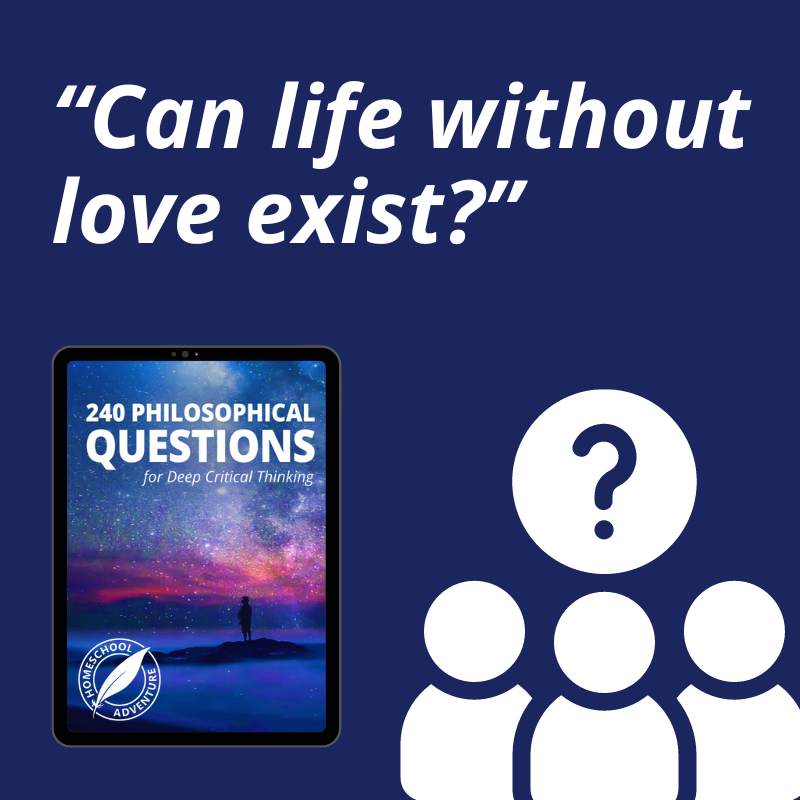
Here’s a collection of philosophical questions about love:
- Which is more important: love or money? Why?
- Is there such thing as true love? If yes, where does it come from?
- Do all human beings want to be loved?
- Can anyone ever really understand another’s feelings?
- Are children born with an innate love for their parents?
- Are some relationships better than others?
- Can life without love exist?
- What makes someone fall in love?
- Why do people get married?
- Is there a difference between love and lust?
- Is marriage necessary?
- Does love last forever?
- Is it okay to love yourself?
- Is love natural or a choice to be made?
- Where do we find love?
Hard Questions Concerning Death
Have you heard the cliché: “The only certainty in life is death and taxes”?
Death truly is a certainty of life.
While some people choose to face the reality of death head-on, others pretend like it doesn’t exist.
Perhaps it’s the finality of death that sparks fear.
Regardless of how we feel, our time on earth will end at some point in the future.
How should that impact how we live today?
Discussing death can be healthy when done in the right manner.
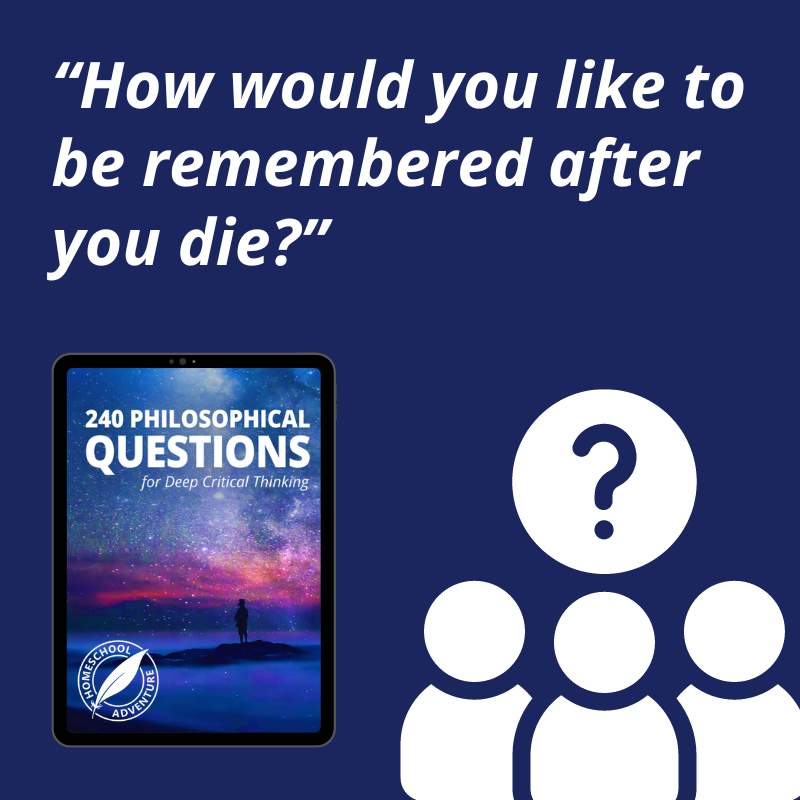
Here are some questions about death we can use to explore the topic, provoke thought, and potentially positively affect how we live:
- Why do people fear death?
- Can we know for certain if there is life after death?
- How would you like to be remembered after you die?
- What happens to the body after you die?
- Does “good death” exist?
- What would happen if we lived forever?
- Should we try to prolong our lives at any cost?
- Could immortality be possible?
- Is euthanasia wrong in all circumstances?
- Is death actually the beginning?
- Why is it acceptable to kill insects?
- Should terminally ill patients be able to choose death?
Questions with Respect to Universal Human Rights

Universal human rights are those rights which apply equally to everyone regardless of race, religion, gender, or creed.
They include freedom of speech, equality before law, right to justice, and more.
The philosophy behind human rights is based upon the idea that humans deserve respect and dignity, and—ultimately—the right to life.
They’re largely considered universal because they are natural, belonging to all members of humanity simply by virtue of being human.
Some philosophers argue that such rights can’t be taken away, while others claim they are conditional.
Here are a few questions to help us think critically about human rights:
- What makes something a human right?
- Do you believe human rights even exist?
- Are human rights actually universal?
- Are humans rights and entitlement the same thing?
- Can torture be justified?
- Is liberty a human right?
- Is personal autonomy a right?
- Do governments have the authority to regulate what people do?
- Does democracy guarantee individual liberty?
- How much control should individuals have over their own bodies?
- If someone commits murder, do they still have the right to life?
- Who has the ultimate responsibility for protecting human rights?
- Has modern technology made us more or less humane?
- Is education a human right for all people?
- Is war ever justifiable?
- Is due process a universal right no matter the crime?
- Is capital punishment ever appropriate?
- Are there any downsides to universal human rights?
- Is free speech a universal right?

Philosophical Questions About Politics, Government, and Society
This category contains some of the hardest philosophical questions out there. Most of us have strong beliefs about politics, government, and society that make it hard to form an unbiased opinion.
Besides political topics, questions in this category also address social issues, social construct, culture, power, and influence.
We can go so far as to question who gets what—when, where, and how.
If you wish to argue successfully—no matter what side of an issue you align with—it is paramount to understand the opposing viewpoint.
Let’s look at a few questions:
- What makes a country democratic?
- What responsibilities does a government have to its constituents?
- Do democracies always make better decisions than dictatorships?
- What constitutes good governance?
- Is rebellion against government ever justified?
- Is socialism fair? What is “fair”?
- If you rob from the rich and give to the poor, is it wrong?
- Are laws always good?
- Is taxation justified?
- What is the ideal government? Why?
- Should the will of the people always be followed?
- What role do political parties play?
- Who defines corruption?
- How do I know whether my views are correct?
- Is voting compulsory?
- Is there such a thing as too much freedom?
- Is bribery always bad?
- Are police officers obligated to protect criminals?
- Should citizens obey unjust laws?
- Who decides which laws apply to whom?
- Where do we draw the line between criminal behavior and civil disobedience?
- Does the state have the moral duty to provide healthcare for its citizens?
- Is wealth redistribution morally correct?
- Should college be free for all? What about grade school or high school?
- Are freedom and liberty the same thing?
- What makes someone free?
- What makes a crime a crime?
- Is it right to govern the number of children families can have to control the world’s population?
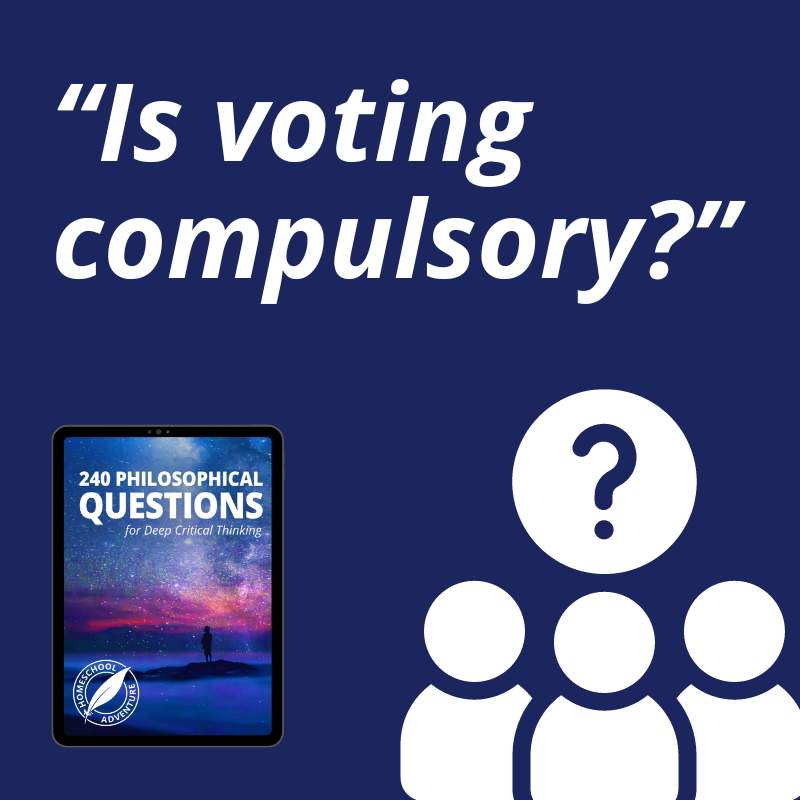
Deep Questions to Make You Think
Deep philosophical questions are designed to help you think critically and reflect on the subject at hand.
They are meant to challenge your beliefs so that you may stand more firmly in them, knowing why you believe what you do.
Here are some examples:
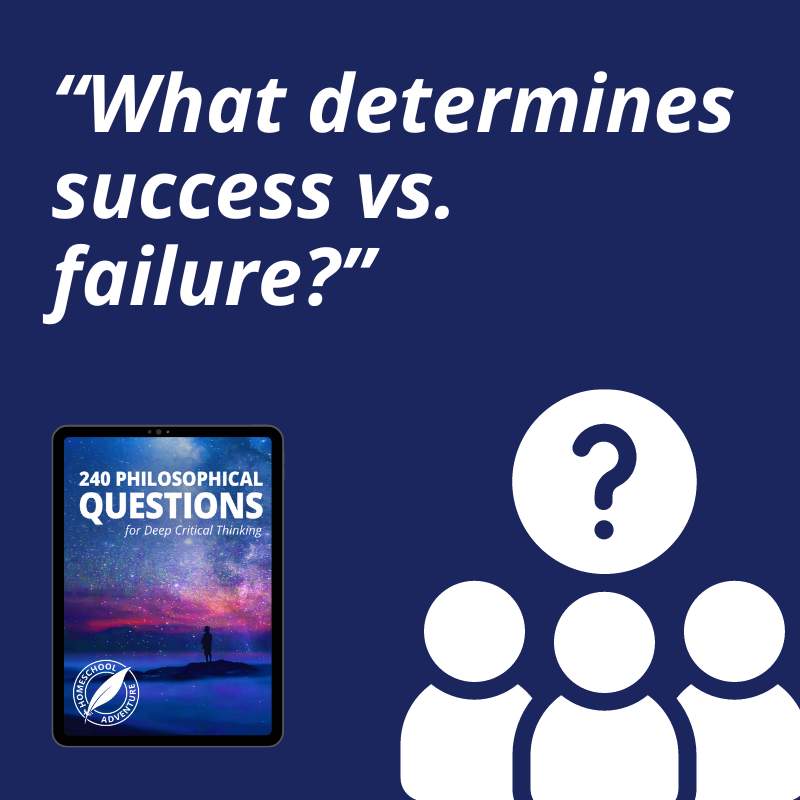
- What is reality?
- What are the limits of science?
- Where did all matter come from?
- Can I trust my senses?
- Is there an innnate moral code?
- Does time exist objectively?
- Who created God?
- Is there a soul?
- Are perceptions real?
- Is “fair” the same for everyone? Who determines whether or not something is “fair”?
- What is time?
- What makes you … you?
- What is truth?
- Is truth reality?
- What gives life meaning?
- What determines success vs. failure?
- Why do bad things happen to good people?
- How do I know what’s true?
- Should we judge others by their actions?
- What’s the purpose of life?
- Where do ideas come from?
- What is justice?
- What is evil?
- What makes someone “good” or “bad”?
- Can something be true without evidence?
- Is fate real?
- At what point does consciousness begin?
- Can time be altered?
- Is there a cause for every effect?
Easy and Funny Questions for Conversation Starters
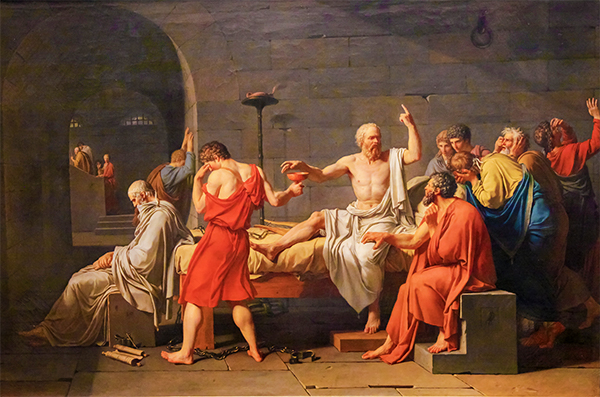
Not all philosophy discussion topics have to be as serious as “What is the meaning of life?”
Learning should be fun and engaging, so don’t shy away from humor when asking deep questions or coming up with unorthodox answers.
Sometimes the most amusing questions lead to the most profound realizations.
Here’s a list of somewhat random philosophical questions to start fun conversations with kids, teens, and older students:
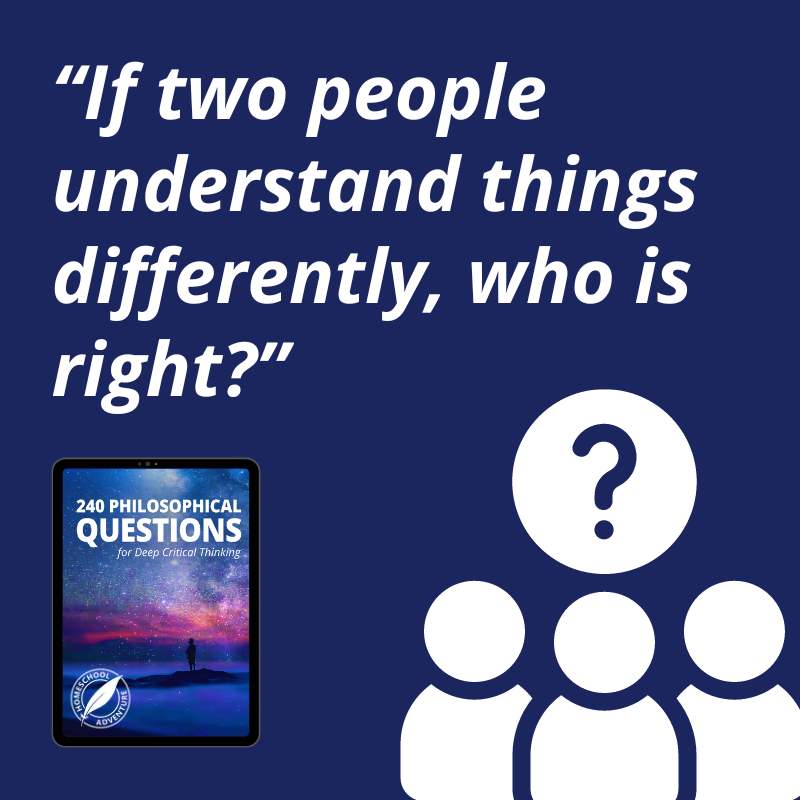
- Is time travel possible? Why or why not?
- Do memories still exist if you forget them?
- Are animals freer than man?
- Are twins unique?
- Are animals like people?
- Do trees feel pain?
- How do you know you’re not dreaming right now?
- Are insects conscious of life?
- What makes something humorous to some and not to others?
- If you save time on something, what happens to that time?
- Why do we talk to ourselves?
- If you try to fail and do, did you actually succeed?
- Can 2+2 ever be something other than 4?
For more ways to engage students in the study of philosophy, try these fun and creative philosophy activities.
Epistemology Questions
Epistemology is concerned with knowledge. It asks questions like::
- How does knowledge work?
- Why do we need it?
- What kind of things count as knowledge?
Epistemologists study these kinds of questions because they’re interested in understanding how humans acquire knowledge.
They also investigate how to differentiate between opinion and justified belief.
As such, epistemological questions analyze which types of evidence can be trusted as reliable sources of information and why.
Needless to say, this category can contain some pretty interesting philosophical questions:
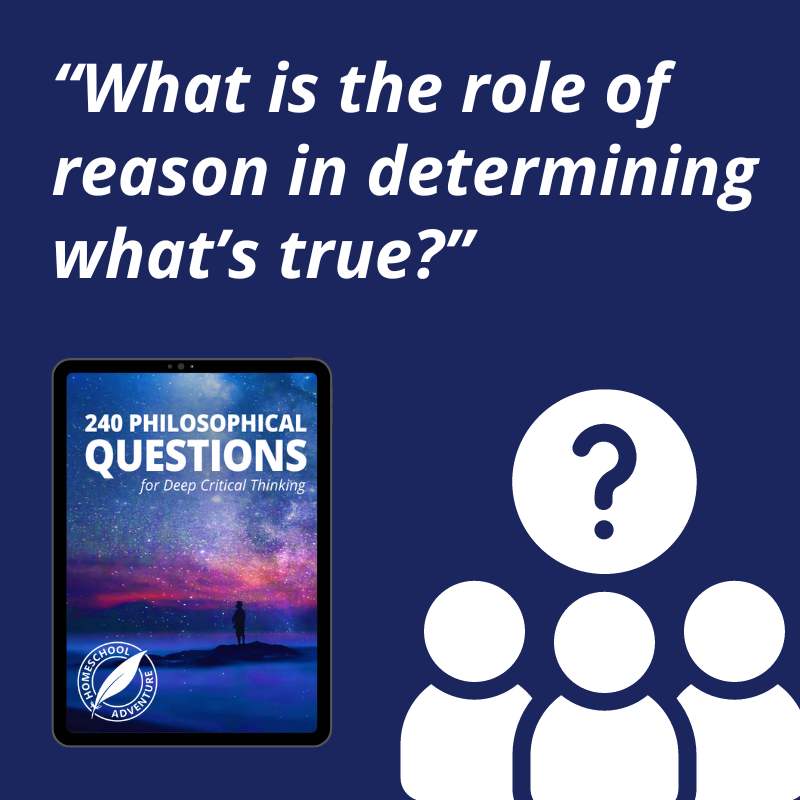
- How do we determine if something is certain?
- How do you know if you know something?
- Does anyone ever truly learn anything?
- Who decides what counts as true knowledge?
- Who determines the difference between fact and fiction?
- What is the relationship between facts and opinions?
- What is the source of human knowledge?
- What is knowledge?
- What is the nature of certainty?
- What is the basis of our confidence in claims made by other people?
- What is the role of reason in determining what’s true?
- What is the relation between logic and reasoning?
- What is the connection between language and thought?
- What is the distinction between perception and imagination?
- What is intuition?
- What is the function of intuition?
- What are thoughts?
- What is the purpose of thinking?
- If two people understand things differently, who is right?
- If we had 1000 years to learn, could we know everything?
- Is there an end of knowledge?
- Is everything subjective?
Logic and the Universe

The historical discipline of logic largely began with Thales, known as the “Father of Western Philosophy.”
Before this point in history, questions of existence were largely “explained” with Greek mythology.
As it stands today, logic can be described as the discipline of distinguishing good vs bad reasoning.
But who defines “good” and “bad”?
It’s important to note that even the best logical conclusions can be false.
Logic doesn’t equal truth.
(Investigate the difference between logical thinking and critical thinking here if you’re interested).
You’ll notice many questions in this category address our origins and creation:
- Can order come from chaos?
- Can something be created from nothing?
- Where did matter come from?
- Is everything relative?
- Is there only one universe? How do we know?
- Is there such thing as absolute truth?
- Are there different levels of existence?
- Do we live forever?
- Was the Big Bang a real event?
- Is space finite?
- Is time eternal?
- Is logic a created concept?
- What time is it really?
- Is the mind the same as the brain?
- What are numbers?
- Does the universe end?
- Is there such a thing as perfection?
- Does sound exist without hearing?
- Are people in a different timezone in the past (or future)?
- Where does fear come from?
- Does pain exist in itself or just our perception of it?
- What is hope?
- Could there be a parallel universe?
Philosophical Questions About Religion
Maybe some of the toughest questions are those of religion. Religion for many is the driving force in their lives (and for good reason).
Religious views affect how we raise our children, interact with others, make decisions, and so much more.
As such, questioning religious principles can be tricky. Some parents go so far as to encourage their kids to not question at all.
Others choose a different route, knowing their children will soon enter a world that will challenge them to question what they believe.
Encouraging teens to question their beliefs—in a structured setting with the Word of God in hand—can prepare them to “make a defense” to those who ask about the hope that is within them (1 Peter 3:15).
Here are some questions about religion:
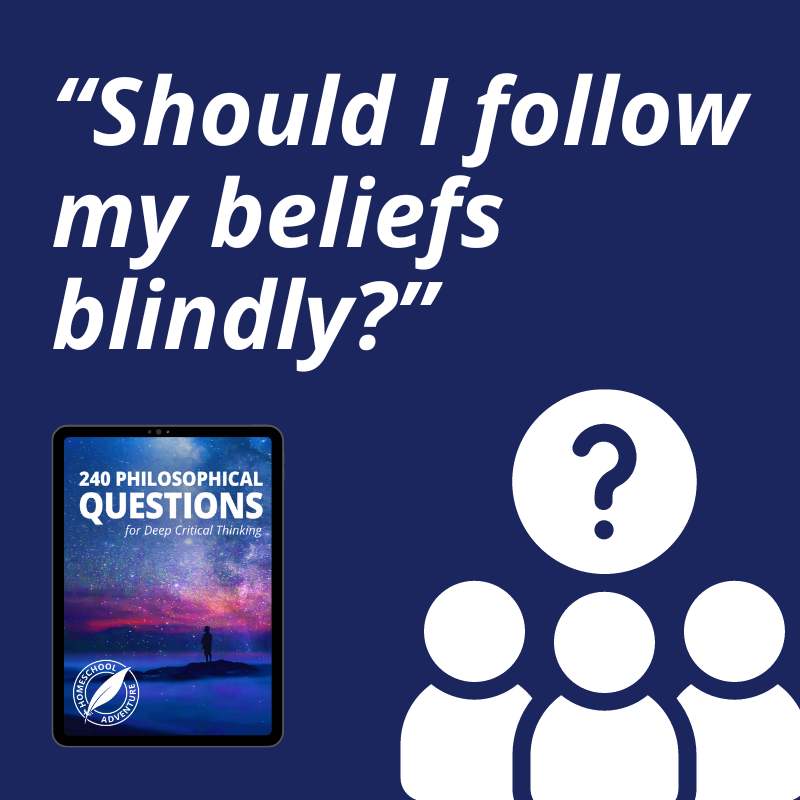
- Does God exist?
- Does God’s existence depend on our belief in him?
- Can love exist without God?
- What constitutes religion?
- Are miracles real?
- Is religion compatible with science?
- Why does faith matter?
- Who decides which religions are right?
- What makes a person a Christian?
- Should I follow my beliefs blindly?
- Is God a created being?
- Can morality exist without religion?
- Is there a higher power?
Unanswerable Philosophical Questions
Let’s talk about some of the challenges that arise when we delve into the world of ideas.
Since philosophical thought lives largely in grey territory, it deals with questions that can’t be answered with the usual “yes or no,” “this or that” definitive response.
And as our children search for answers to these philosophical questions, they will encounter deceptive lies disguised as logic.
Many college professors of philosophy today will tell you that life’s biggest questions remain unanswered.
Yet those who possess a biblical worldview have a much different perspective.
Even in a lost, confusing world, the Bible is a compass that always points true North. It declares truth in matters the world deems unanswerable.
That’s why it is so important to teach our children how to think and how to reason from a biblical perspective.
Philosophy and Critical Thinking Go Hand in Hand
Critical thinking involves asking questions, analyzing arguments, evaluating evidence, and making decisions based on those evaluations.
It requires us to use logic, reasoning skills, critical analysis, and judgment.
Sound familiar?
Critical thinking is an essential skill that allows us to make decisions and solve problems effectively.
And while it may not seem so at first glance, it is a skill that enables us to defend our beliefs effectively when challenged.
That’s why we focus so heavily on critical thinking from a biblical worldview in the resources we offer at Homeschool Adventure.
If you’re looking for a way to help your students develop critical thinking from a biblical worldview as they explore the history of ideas, check out Philosophy Adventure:
Philosophy Adventure teaches students 6th-12th grade how to write skillfully, think critically, and speak clearly as they explore the history of ideas.
It was written to bring history alive! Instead of memorizing facts, students “travel back in time” to walk alongside ancient philosophers.
All the while, they will be challenged to examine what they believe about the world around them, and why they believe it.
By the end of the year, students will have written their very own book of philosophy!
Tips for Using These Questions as Philosophical Debate Topics
Philosophical questions about life are naturally thought provoking.
When used properly, even controversial philosophy topics can be effective springboards for critical thinking—a skill that will benefit your teen for life!
Questions can spark wonderful, stimulating debate among older students, especially those in upper middle through high school.

And philosophical debates can be fun but also challenging, providing the perfect opportunity to practice critical thinking.
If you’ve never tried debating in your homeschool, you can use some of these philosophical questions to start.
A quick note:
Not all questions are practical for satisfying philosophical discussions.
The purpose of debate in the homeschool setting is to practice and improve critical thinking, active listening, argument formation, and even teamwork.
Its purpose is not to waste time on frivolous arguing.
Those of us who believe that the Bible is the Word of God know that absolute truth exists. Consequently, questions to which Scripture provides clear answers may not be the best choice for learning how to debate.
Likewise, you may want to avoid questions whose answers would have to be based solely on speculation—with no practical way to confirm facts or conclusions.
However, keeping all of that in mind, it can be immensely productive for older, more mature students to try to debate a stance they personally disagree with.
Doing so can help them better understand their opponent … and equip them to effectively counter opposing views they may face in “real life.”
Only you know whether your students are ready for such a task, so use discernment.
Since the list of questions we provided is pretty extensive, here’s an abbreviated list of questions that would make great philosophical debate topics:
- What makes us human?
- Is it okay to lie to protect yourself?
- Do all people deserve respect?
- Can we choose our emotions or do they just happen?
- Can predestination and free will coexist?
- Does anyone else’s happiness affect my own?
- Is it always best to seek out pleasure over avoiding pain?
- Is it possible to make moral judgments without religion?
- Is killing justified under certain conditions?
- Should all actions have equal consequences?
- Should we judge acts based on their outcomes alone?
- Is it wrong to kill animals?
- Can life without love exist?
- Should terminally ill patients be able to choose death?
- What makes something a human right?
- Is personal autonomy a right?
- If someone commits murder, do they still have the right to life?
- What constitutes good governance?
- Is rebellion against government ever justified?
- Is socialism fair? What is “fair’?
How to Debate Philosophy
When you debate a philosophical question, follow the same general outline as any other debate process.
An at-home, sibling-to-sibling or parent-child debate may proceed as follows:
- Assign the debate topic, first and second positions (for or against the question), and allow time for students to brainstorm ideas.
- Encourage students to organize their ideas into simple arguments or points.
- Practice structuring those ideas into a speech with an introduction, rebuttal (for those arguing in the second position), points to make, and a conclusion.
- Designate a neutral third party to declare a “winner.”
- Start the debate.
Depending on your schedule, this entire process can be done in a single day—or stretched over the course of a week (or even a month).
How to Handle Different Age Groups
Simply adjust how deeply you go into each step, depending on the ages of your students.
For younger middle school students, consider keeping the debate more like a simple discussion and less of an emphasis on structure and speeches.
However, you may want to encourage high school students to organize well-developed arguments and rebuttals.
Philosophical questions about life are naturally thought-provoking.
We actually have even more thought-provoking questions here.
When used properly, even controversial philosophy topics can be effective springboards for critical thinking—a skill that will benefit your teen for life!

